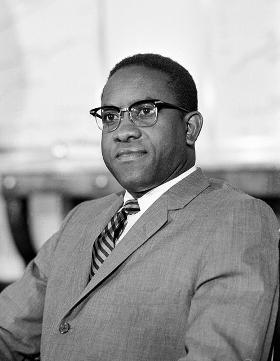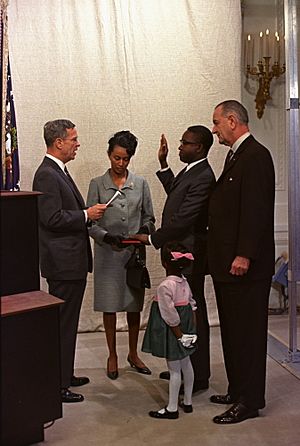Andrew Brimmer facts for kids
Quick facts for kids
Andrew Brimmer
|
|
|---|---|
 |
|
| Chair of the District of Columbia Financial Control Board | |
| In office June 1, 1995 – September 1, 1998 |
|
| Preceded by | Position established |
| Succeeded by | Alice Rivlin |
| Member of the Federal Reserve Board of Governors | |
| In office March 9, 1966 – August 31, 1974 |
|
| President | Lyndon B. Johnson Richard Nixon Gerald Ford |
| Preceded by | C. Canby Balderston |
| Succeeded by | Philip Coldwell |
| Personal details | |
| Born |
Andrew Felton Brimmer
September 13, 1926 Newellton, Louisiana, U.S. |
| Died | October 7, 2012 (aged 86) Washington, D.C., U.S. |
| Political party | Democratic |
| Spouse | Doris Scott |
| Children | Esther |
| Education | University of Washington, Seattle (BA, MA) Harvard University (PhD) |

Andrew Felton Brimmer (born September 13, 1926 – died October 7, 2012) was an important American economist and business leader. He made history as the first African American to serve on the Federal Reserve Board of Governors. This board helps manage the United States' money and banking system. Brimmer was a member of the Democratic Party.
Early Life and Education
Andrew Brimmer was born in Newellton, Louisiana. His family were sharecroppers, which means they farmed land owned by others and paid rent with a share of their crops.
He went to schools that were segregated by race. This meant Black and white students went to separate schools. He graduated from Tensas Rosenwald High School. This school later closed when schools in the area became desegregated.
Brimmer served in the United States Army from 1945 to 1946. After his military service, he went to the University of Washington in Seattle. There, he earned both his bachelor's and master's degrees.
In 1951, Brimmer received a special scholarship called a Fulbright scholarship. This allowed him to study in India. In 1952, he started studying at Harvard University in Cambridge. He earned his Ph.D. (a very high degree) from Harvard in 1957.
Career Highlights
While still studying at Harvard, Brimmer worked as an economist at the Federal Reserve Bank of New York. He also helped set up the central bank for the country of Sudan.
After finishing his studies, Brimmer became an assistant secretary in the U.S. Department of Commerce. This department helps with business and trade in the country.
In 1966, U.S. President Lyndon B. Johnson chose Brimmer to join the Federal Reserve Board of Governors. This was a very important role, and Brimmer was the first African American to hold this position. He served on the board for eight years.
After leaving the Federal Reserve in 1974, Brimmer taught at Harvard University for two years. Later, he started his own business consulting company called Brimmer & Company. He also helped lead the board of directors for Tuskegee University for many years.
Awards and Honors
Andrew Brimmer received many awards for his achievements:
- Named government man of the year by the National Business League, 1963
- Arthur S. Flemming Award, 1966
- Russwurm Award, 1966
- Golden Plate Award from the American Academy of Achievement, 1967
- Elected to the American Academy of Arts and Sciences, 1970
- National Urban League Equal Opportunity Award, 1974
- Horatio Alger Award, 1974
- Elected to the American Philosophical Society, 1976
- Fulbright 40th Anniversary Distinguished Lecturer in Ghana and Nigeria, 1986
- Samuel Z. Westerfield Award, the highest award from the National Economic Association, 1990. This award recognized his great service, excellent studies, and high standards.
- Black Enterprise A.G. Gaston Lifetime Achievement Award, 2007
In 2020, the American Economic Association created the "Andrew Brimmer Undergraduate Essay Prize." This award is given to college students who write the best essay about the "economic well-being of Black Americans."
Personal Life and Death
Andrew Brimmer was married to Doris Millicent Scott. They had one daughter, Esther Dianne Brimmer.
Andrew Brimmer passed away on October 7, 2012, in Washington, D.C.
| Government offices | ||
|---|---|---|
| Preceded by C. Canby Balderston |
Member of the Federal Reserve Board of Governors 1966–1974 |
Succeeded by Philip Coldwell |
| New office | Chair of the District of Columbia Financial Control Board 1995–1998 |
Succeeded by Alice Rivlin |
 | Mary Eliza Mahoney |
 | Susie King Taylor |
 | Ida Gray |
 | Eliza Ann Grier |

